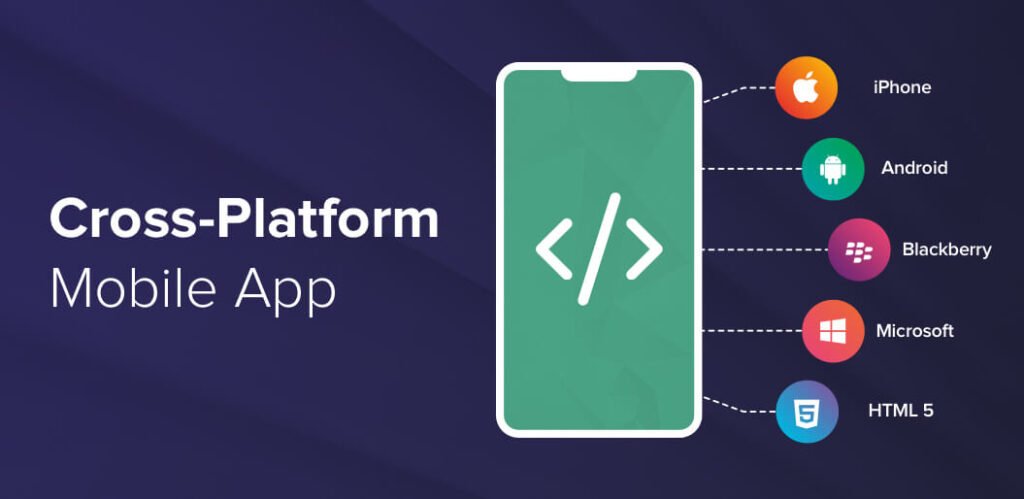Cross-platform mobile app development UK is becoming increasingly important as businesses look to take advantage of users’ growing dependency on their smartphones and tablets.
Mobile apps represent a great marketing, promotional, customer service, and communication opportunity for companies; however, developing an effective app across all major platforms can prove challenging. Creating a successful application that works well on iOS, Android OS, and other popular platforms requires the expertise of experienced cross-platform mobile developers to meet user expectations.
In this blog post, we’ll discuss what is involved in developing an effective cross-platform mobile app development UK.
What is Cross Platform Mobile App Development? A Beginner’s Guide.
Cross-platform mobile app development UK is an innovative way to create applications that can be used on multiple operating systems and devices, such as iOS and Android.
This type of mobile app development UK allows developers to write code once and then deploy it on multiple platforms, making the process much more straightforward and cost-effective. At a basic level, cross-platform Mobile app development UK involves writing the code using HTML, JavaScript, or another language that can be easily adapted to different platforms.
As such, developers can create apps that look the same across all target platforms without having to rewrite large portions of code. This approach makes it easier to maintain consistency between each version and ensures faster time-to-market. Mobile app development UK can also be distributed and installed in app stores more quickly than native applications.

The main advantages of developing cross-platform Mobile app development UK include cost savings due to only having to write code once, increased scalability by reaching a larger audience with just one app, and faster updates since changes only need to be implemented in one place.
However, there are also some drawbacks, such as fewer features available on specific platforms and decreased performance compared with native applications. Developers need to consider these factors when deciding whether or not cross-platform mobile app development UK is right for them. To start this form of development, beginners will need a good understanding of how coding works and knowledge of programming languages used for creating cross-platform apps, including HTML5 and JavaScript.
Additionally, it would help if they had access to frameworks such as React Native or Ionic, which provide an easy way for beginners to develop their applications while still allowing them access to devise APIs so they can customize their user experience further. Finally, they should ensure that they have a good grasp of design principles such as usability testing so that their finished product is the best possible version of itself.
Benefits Of Cross-Platform Mobile App Development.
Cross-platform mobile app development UK provides many benefits to businesses in the region. Using a single codebase allows developers to build and maintain their mobile apps quickly and easily across multiple platforms. This simplifies reaching a wide range of customers and preserves the investment in creating the application since one version can be used for all devices.
Additionally, cross-platform mobile app development UK are typically more cost-effective than native apps, meaning businesses can take advantage of developing high-quality applications on a limited budget. Cross-platform mobile app development UK also provides users with an integrated experience as they venture from one device to another, helping drive visitor loyalty and ultimately providing businesses with increased revenue.
Here are some most important benefits of cross-platform mobile app development UK
- Cross Platform Mobile App Development UK allows businesses to reach a broad audience on multiple operating systems simultaneously.
This allows companies to access a more extensive customer base, increase their return on investment (ROI), and improve their brand identity. Additionally, it helps organizations save time and money as they no longer have to create separate versions for each mobile platform.
- Cross Platform Mobile App Development UK allows developers to make changes once and deploy them across different platforms instantaneously, thus eliminating the need for tedious code rewriting or porting.
This also allows these professionals to realize cost savings by not having to purchase new development tools each time an update needs to be introduced.
Moreover, this type of development is beneficial in terms of testing flexibility, as applications can be tested on iOS and Android devices simultaneously.
- Utilizing cross-platform mobile app development UK also ensures that all users are running on the same version of an application, thereby reducing technical support requests and providing a smoother user experience due to consistent performance across different platforms.
Furthermore, cross-platform mobile apps often incorporate powerful features such as GPS tracking, Bluetooth integration, and camera access which are beneficial for businesses in terms of marketing initiatives and enhancing customer engagement.
- Developing multiple platforms also allows companies to take advantage of native capabilities like push notifications, geofencing and augmented reality, which can provide customers with an enhanced mobile experience when using their respective applications.
Additionally, cross-platform mobile app development UK allows businesses to quickly introduce new features without having any significant impact on existing code – meaning that updates can be pushed out more frequently without compromising the stability or functionality of the overall product offering available through various platforms.
Challenges Faced In Cross-Platform Mobile App Development
Cross-platform mobile app development UK faces a number of challenges. Firstly, businesses seeking to develop these apps must cater to different operating systems and multiple devices with varying technical capabilities. This can be time-consuming and costly as it requires developers to understand various technologies, such as Android and iOS, while also adhering to the specific design guidelines set by each platform.
Also, a lack of compatibility between platforms can impact the overall user experience that a cross-platform mobile app provides. Developers must ensure that their creation can work seamlessly on all relevant devices, which is often tricky given that different platforms use different programming languages and architectures.

Additionally, some features may only be available on some platforms or may need to be implemented differently across devices. In addition, cross-platform mobile app development UK is further hampered by the fact that updates take longer than native app development due to the complexities involved in ensuring compatibility across multiple platforms.
Furthermore, debugging and testing are more complex when developing for multiple platforms, which can lead to significant delays in launching applications onto the market.
Furthermore, device fragmentation is another major issue facing UK businesses interested in creating cross-platform apps. Different models of phones vary significantly in terms of size, hardware capabilities, and software versions, as well as other factors such as language settings which all need to be considered during development stages.
This means developers must consider how their app will accommodate various screen sizes while providing functionality across older versions of software and languages. Finally, a further challenge faced by those developing cross-platform mobile app development UK is ensuring they remain secure through regular updates and patches due to vulnerabilities being discovered over time on most operating systems.
It’s essential for businesses looking to release apps across multiple platforms to ensure they are regularly maintained. Hence, they remain protected against potential threats affecting user data or damaging their reputation.
Tools Necessary for Cross-Platform Mobile App Development
If a business wants to develop a mobile app that can be used on various platforms, it will need the right tools. Developing apps across various platforms such as iOS, Android and Windows can be complex due to their different underlying technologies and the programming languages needed.
UK businesses should look into mobile app development platforms such as Xamarin, Cordova, and Alpha Anywhere that allow them to create apps for multiple platforms with increased speed and efficiency while only using one shared codebase.

Additionally, they may want to use specialized APIs from an experienced tool vendor or utilize software kits like Google Flutter, which provide user-friendly UI components and animation tools which help create versions of an app to fit all devices. Firms in the UK must also have access to suitable data storage options such as Firebase or AWS for functional tracking purposes or payment processing services like Apple Pay or Stripe.
All these tools are vital for developing dynamic, cross-platform apps that offer consistent experiences across various devices and respond quickly to user input.
1. Integrated Development Environment (IDE):
An IDE is essential for any software development. It is a comprehensive set of tools that enable developers to create, debug and deploy cross-platform mobile apps quickly and easily. Popular IDEs include Android Studio, Xamarin, and Visual Studio.
2. Programming Languages.
Programming languages such as Java, Swift, and C# are required to create a cross-platform mobile app. Java is the official language used by Google’s Android operating system, while Swift is an open-source language developed by Apple for iOS devices.
C# is a popular choice for cross-platform mobile app development UK as it allows developers to simultaneously target the two largest mobile platforms – iOS and Android.
3. SDKs.
Software Development Kits (SDKs) are necessary when developing mobile applications. They provide frameworks that allow developers to write code in the appropriate programming language, access APIs needed for specific device functions, compile the code into executable files and execute them on real devices or emulators/simulators.
These SDKs include Xcode for iOS apps, Google Play Services SDK for Android apps, and Microsoft .NET Framework SDK for multi-platform app development.
4. Databases.
To store data securely with easy retrieval, databases such as SQLite and MongoDB are essential when building mobile apps. SQLite provides a lightweight database engine that can be embedded within an application, whereas MongoDB offers an open-source document database for cloud applications.
5. Cloud Services:
Cloud services allow apps to store data remotely on servers across the internet, providing scalability and reliability of backup processes without putting too much strain on hardware resources.
Popular cloud services include Amazon Web Services (AWS), Microsoft Azure, Google Cloud Platform (GCP), and IBM Bluemix, which all offer various levels of storage space at varying price points depending on usage requirements.



